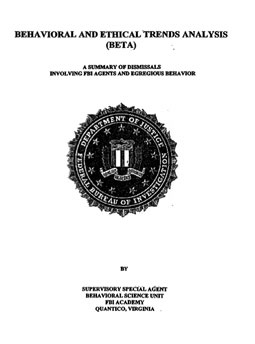Part 3 - Chapter 15
Bad actors: A laundry list of horrors
In the weeks immediately preceeding Jonathan Luna's death, the issue of FBI misconduct and cover-up had come under intense congressional scrutiny. Both houses of Congress, driven by concerned members of both parties, were beginning to wake up and smell the bad coffee.
The alarming report of the House Committee on Government Reform was just an appetizer for a shocking report delivered to the chambers of the U.S. Senate Finance and Judiciary committees.
Cover from the suppressed 2000 FBI internal report, "Behavioral and Ethical Trends Analysis: A Summary of Dismissals Involving FBI Agents and Egregious Behavior"
Click here to download Part 1 of the BETA report. PDF format. 2,400k.
Click here to download the Summary of Observations of the BETA report. PDF format. 300k.
It took two years for members of the U.S. Senate to learn that the FBI in 2000 conducted its own internal study on agent misconduct. The FBI then stonewalled for months to keep its report from the Senate. Known as the Behavioral and Ethical Trends Analysis, or BETA, the report details a study conducted by the FBI's Behavioral Sciences and Law Enforcement Ethics units. The Ethics Unit has since been starved of funds by the FBI.
The report focused on seventy-seven agents who had been caught, investigated and fired by the FBI from 1986 to 1999. The study helps us to profile bad acting FBI agents. Bad actors aren't newbies, the report finds. On average they'd been with the FBI for more than ten years before they were caught, and seventy percent had received bureau commendations. These, then, are agents who know the ropes. They'd also had a history of misconduct problems.
The bad actors engaged in everything from child abuse, sexual fetishism to murder. More to the point of this book, one agent had stolen $400,000 from the informants' fund, while another killed his informant, after carrying on an affair with her for years.Senator Charles Grassley, the Iowa Republican who chairs the Senate Finance Committee, and Senator Patrick Leahy, a Democrat from Vermont on the Judiciary Committee, got wind of the BETA report in 2002. In November 2002, a year before Jonathan Luna's death, and about the same time the $36,000 went missing from the evidence vault, Grassley and Leahy wrote the FBI for a copy of the BETA report. It was easier to get the money out of the evidence vault. The senior senators didn't receive the report until July 2003, shortly after William Bulger was grilled by the House on his brother Whitey's disappearance.
With this secret, internal FBI report came a letter from the Justice Department stating the report contained "sensitive data" and "should not be publicly disclosed." On February 18, 2004 Grassley wrote FBI Director Robert Mueller about the report and the claims of secrecy surrounding it.
The senator posted a press release to his web site titled, "Grassley says FBI must address internal misconduct." The letter describes portions of the BETA report, which Grassley describes as a "laundry list of horrors."
Grassley wrote Director Mueller that he had "concerns about the Behavioral and Ethical Trends Analysis (BETA) report, its alarming findings, a lack of response to the findings and recommendations, a general lack of support for the project and even efforts to prevent its completion, and attempts to withhold the report from Congress and the public.
"The BETA report analyzed the worst of the worst at the FBI - agents whose actions were so egregious that they were fired and oftentimes prosecuted. Authored by the Behavioral Sciences Unit, with the aid of the Law Enforcement Ethics Unit, the shocking report is a laundry list of horrors, with examples of agents who committed rape, sexual crimes against children, other sexual deviance and misconduct, attempted murder of a spouse, and narcotics violations, among many others. For example:-- An agent "was calling sex hotlines with Bureau phones while on duty."
-- An agent "engaged in egregious conduct engaging in a non-consensual sexual acts with a subordinate employee (rape)..."
-- An agent ... "used his Bureau weapon to shoot his spouse resulting in criminal attempted homicide charges."
-- "A former agent engaged in interpersonal violence, such as sexual abuse of minor children, physically assault of an adult female, and long-term misconduct."
-- "A former agent had a severe gambling/alcohol problem and engaged in theft of informant funds to the excess of $400,000 resulting in an indictment, arrest, and imprisonment."
-- "This agent was dismissed for admission of unauthorized disclosures of classified information to individuals representing a foreign intelligence agency... SA acknowledged disclosing a substantial amount of classified information about the FBI to others..."
-- "Former agent pled guilty to manslaughter after killing his informant, after years of an inappropriate emotional and sexual relationship with her. He covered up the murder ..."
-- This agent was fired for criminal, sexual offenses involving numerous incidents of sexual behavior in public, including public masturbation and frequent assault on his victims."Overall, the report indicated that these fired agents often exhibited warning signs, such as a history of misconduct, before they committed the act that warranted their termination. The majority (63%) of fired agents had been engaged in long-term misconduct, and almost half (45%) had a history of previous disciplinary action. While it's laudable that the FBI does fire agents who commit such terrible acts, these findings raise concerns about whether the FBI was dealing with problem agents soon enough and rigorously enough, possibly because of a reluctance to impose severe discipline. The report states, "There were some 'markers' identified in dismissed FBI Agents that included Agents hired with a checkered past, Agents with an established history of long-term misconduct ... Agents with a history of severe emotional, psychological, family problems, substance abuse problems, or clear indicators of such." By identifying whether there are common traits among agents who commit such wrongdoing, as the BETA report suggests, the FBI might be better able to screen out potentially troubling applicants, more closely monitor agents who commit misconduct and react more quickly to severe and repeated misconduct....
"Another alarming finding in the report was that the FBI failed to conduct a thorough background check on some of the agents in the study, or it hired them despite knowing they had problems: 'Despite a negative recommendation or "no hire" from employers, the individual was hired.' The report recommended that the FBI keep statistics on fired agents in the future to identify other trends in behavior."
Grassley wrote that he was particularly concerned that the FBI had suppressed the report and cut funding to its authors.
"This is unfortunate because it sends a signal to the public, as well as to other law enforcement agencies in this country and around the world, that ethics is not important to the FBI," Grassley wrote. "The specific role and mission of the ethics unit - to teach ethics to new agents and other agencies; and to cast a critical eye on the operations of the FBI and raise concerns about unethical practices - is now essentially gone, and the FBI is the worse for it. The ethics unit's useful and important projects such as the BETA report, or the 1999 report on the double standard in discipline, will be no more."
Grassley points out, "The BETA report almost never saw the light of day. Preliminary work began in 1996, but approval did not come until January of 1998. However, as the report states on page 80, 'Funding was again delayed by FBI HQ in the fall of 1998.' I understand there were other obstacles as well, but the report was finally completed in June 2000 and then presented to senior FBI officials. It was not released publicly, nor was its existence even announced.
"There were other efforts to cover up the BETA report. Sen. Patrick Leahy — in his capacity as Chairman of the Senate Judiciary Committee at the time — and I requested the BETA report in a letter dated November 26, 2002. We did not receive the report until July 2003. Along with the report came a letter from the Justice Department that stated, in part: 'The Bureau has advised that this document consists of a compilation of sensitive data concerning FBI disciplinary matters and should not be publicly disclosed.' The letter gives no other justification for the statement that the BETA report should be suppressed. Privacy concerns cannot be an issue, since the fired agents in the study are not named, and even names of agents who worked on the report are redacted. Essentially, the Department letter states the FBI's position is that the BETA report is embarrassing, so the public, who paid for the report with tax dollars, should not know about it. I find this to be a novel approach to suppressing embarrassing information. Usually when agencies seek to suppress information, they invoke reasons such as 'classified information' or the 'privacy' of bureaucrats who commit wrongdoing."
In other words, the FBI was developing tools to help identify and profile bad actors. It turns out FBI directors think profiling is a useful to tool to catch criminals; all criminals, that is, except those who work for the bureau.Director Mueller's FBI responded predictably to Grassley's release of the report. FBI Assistant Director Cassandra Chandler issued a press release describing the FBI's BETA 2000 report as old and containing "anecdotal evidence." Mueller and Chandler know that's not honest. If the report was old, it was only because the FBI sat on it for four years. And "anecdotal" is a lawyer's phrase that seems misapplied to a scientific study involving almost eighty known wrongdoers.
"It is important that the American public understand that the Bureau has gone to great lengths to improve its internal disciplinary process and bolster confidence in its effectiveness and impartiality," Chandler wrote.
As for bad acting agents, Chandler wrote, "Any allegation of wrongdoing or impropriety by FBI employees is taken seriously and aggressively investigated. Nothing better ensures this standard than a fair and equitable disciplinary process that applies to all employees."
Yet it was neither fair nor equitable, two months earlier, when leaking FBI agents summarily destroyed the reputation of their colleague, Jonathan Luna. They demand a better standard of treatment for themselves than they offer others.


